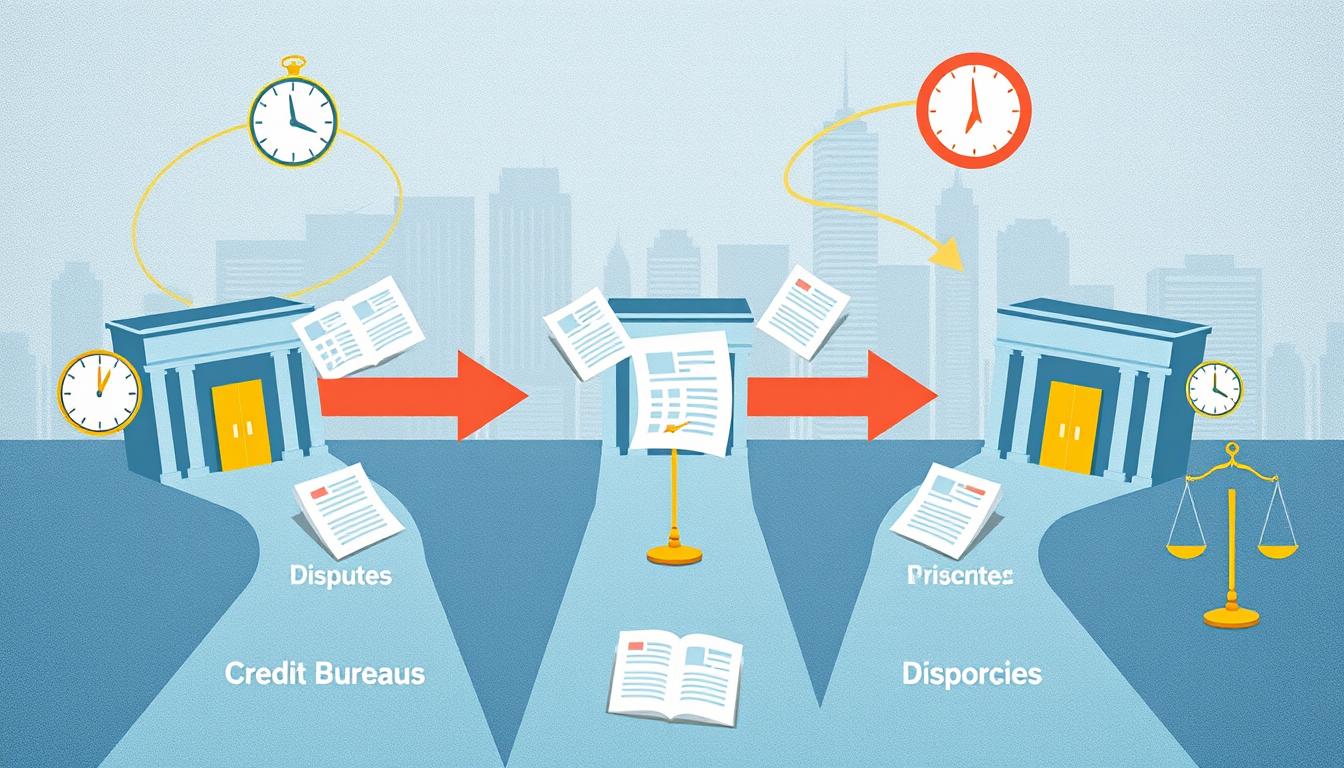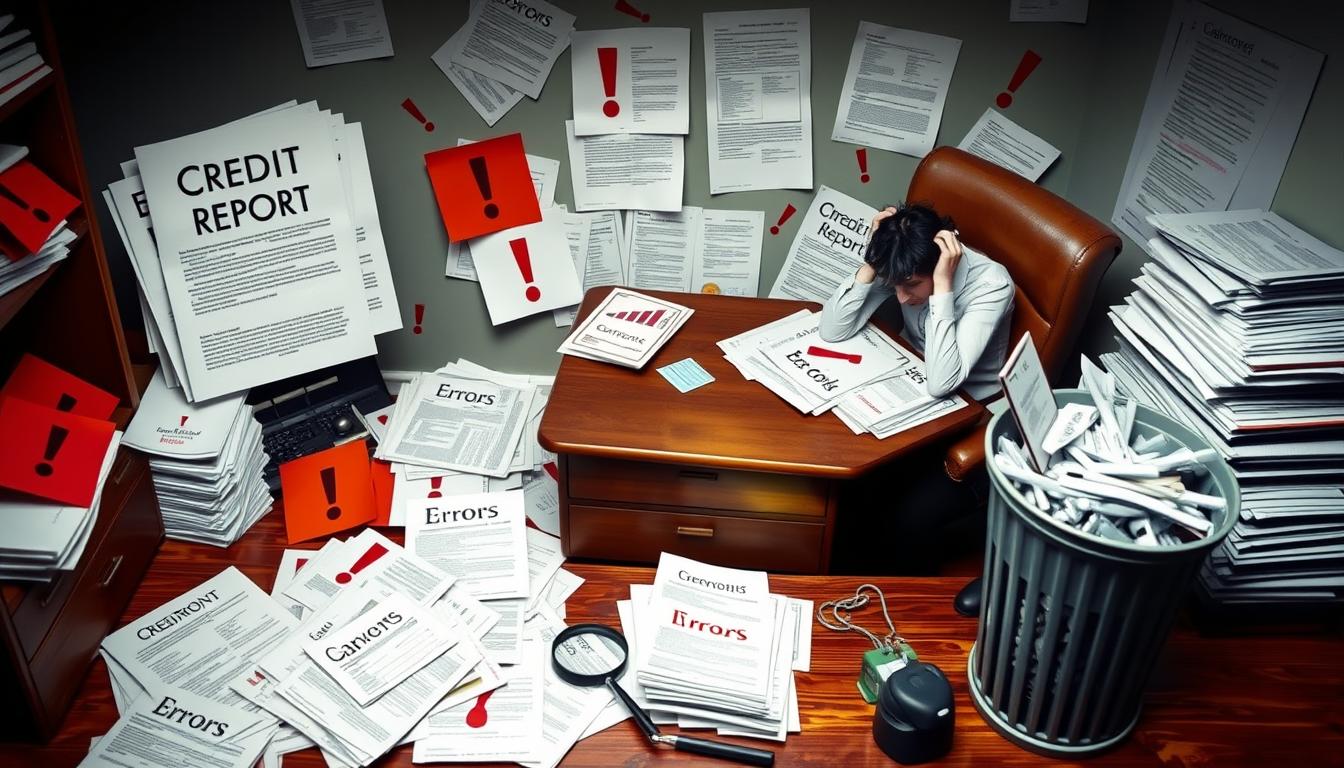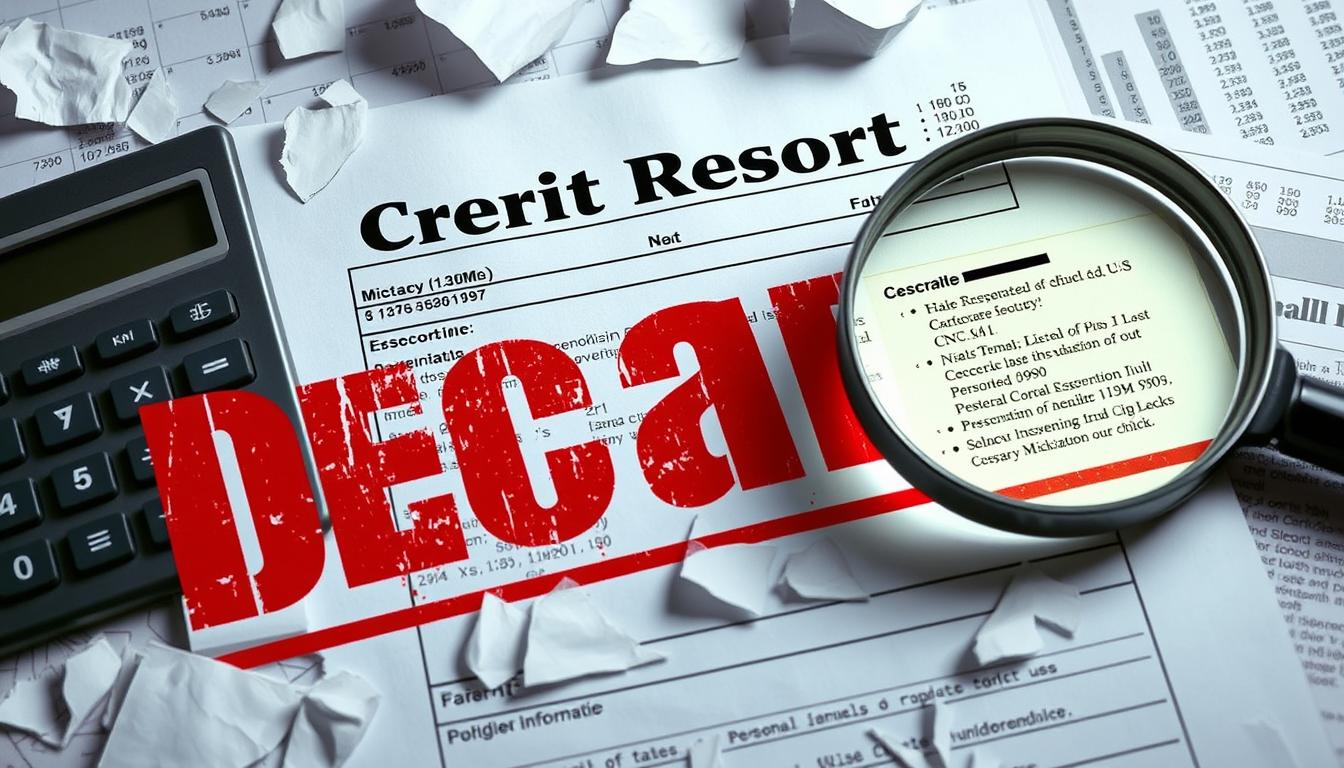Your credit score is vital for financial health. Errors in your credit report can be troublesome. Don’t ignore these mistakes – dispute them with major credit bureaus.
This guide provides addresses for TransUnion, Experian, and Equifax. These are the top three credit reporting agencies. Use this info to challenge inaccuracies and regain control of your credit profile.
Key Takeaways
- The addresses for the three major credit bureaus – TransUnion, Experian, and Equifax – are essential for disputing credit report errors.
- Knowing how to effectively contact all three credit reporting agencies is crucial for addressing any discrepancies in your credit file.
- Proactively disputing credit report mistakes can help improve your credit score and financial standing.
- Understanding the credit dispute process and the information required can increase your chances of a successful resolution.
- Monitoring your credit reports regularly and addressing issues promptly is key to maintaining a healthy credit profile.
Understanding the Importance of Disputing Credit Report Errors
Credit report errors can lead to serious financial problems. They may make it hard to get loans, credit cards, or jobs. It’s vital to address and dispute any mistakes in your credit history quickly.
Accurate credit reports are key for good financial health. Errors can hurt your credit score. This makes it harder to get good interest rates or access credit.
The credit dispute process can improve your overall financial well-being. It’s not just important, it’s necessary for maintaining your financial standing.
- Inaccurate credit information can lead to higher interest rates on loans and credit cards.
- Erroneous data on your credit report may result in the denial of rental applications or job opportunities.
- Disputing and resolving credit report errors can help maintain your credit score and ensure your financial profile accurately reflects your creditworthiness.
Regularly review your credit reports to protect your financial future. Look for any issues and address them promptly. This helps maintain a healthy credit profile.
Taking action on credit report problems safeguards your financial well-being. It’s a crucial step in managing your credit effectively.
“Protecting your credit report is essential for accessing the best financial opportunities and securing your financial future.”
3 Credit Bureaus Addresses for Disputes
Addressing credit report errors is vital for maintaining financial health. Knowing the correct mailing addresses for TransUnion, Experian, and Equifax is crucial. These addresses ensure your dispute letters reach the right destination.
TransUnion Address for Credit Disputes
To dispute items on your TransUnion credit report, use this address:TransUnion Consumer Dispute Center
P.O. Box 2000
Chester, PA 19016-2000
Experian Address for Credit Report Disputes
For Experian credit report disputes, send your letter here:Experian
P.O. Box 4500
Allen, TX 75013
Equifax Address for Disputing Credit Inaccuracies
To dispute your Equifax credit report, mail your letter to:
Equifax Information Services LLCP.O. Box 740256
Atlanta, GA 30374-0256
Using these addresses ensures efficient processing of your credit disputes. Always include all necessary information and documentation with your dispute letters. This helps resolve issues quickly and effectively.

Preparing Your Credit Dispute Letter
A well-crafted credit dispute letter is key to fixing errors on your credit report. This guide will help you create a persuasive letter to credit bureaus.
You’ll learn what to include and how to write effectively. These tips will boost your chances of success.
Essential Information to Include
Your credit dispute letter should contain these important details:
- Your full name, current address, and date of birth
- The specific items you are disputing on your credit report
- A clear explanation of why the information is inaccurate or incomplete
- Copies of any supporting documentation, such as bills, statements, or correspondence
- Your request for the credit bureau to investigate the dispute and correct the error
Tips for Writing an Effective Dispute Letter
Follow these tips to make your credit dispute letter more compelling:
- Be clear and concise in your language, avoiding technical jargon or overly complex wording.
- Organize the letter in a logical, easy-to-follow structure, with clear headings and bullet points.
- Maintain a polite and professional tone throughout, avoiding any aggressive or confrontational language.
- Provide specific details and evidence to support your dispute, rather than making general claims.
- Keep a copy of the letter and any supporting documents for your own records.
These guidelines will help you craft a strong credit dispute letter. You’ll be more likely to get errors fixed quickly.
Sending Your Dispute to Credit Reporting Agencies
After preparing your credit dispute letter, it’s time to send it to credit reporting agencies. There are several ways to submit your dispute. Each method has its own benefits and things to consider.
Credit Dispute Submission Methods
- Mailing Your Dispute: Send your letter by certified mail with return receipt requested. This method provides proof of delivery and creates a paper trail. It ensures credit bureaus receive your dispute.
- Online Dispute Submission: Many credit bureaus let you submit disputes through their websites. This digital method is often faster. Follow their instructions carefully and save any confirmation numbers.
- Faxing Your Dispute: Faxing is another option for sending your dispute letter. Check the correct fax numbers for each credit bureau. Keep the fax transmission report as proof.
Keep detailed records of your credit dispute process efforts. This documentation is important for tracking your dispute’s status. It can also help if you need to provide more information later.
| Credit Bureau | Mailing Address | Online Dispute | Fax Number |
|---|---|---|---|
| TransUnion | TransUnion Consumer Solutions P.O. Box 2000 Chester, PA 19016-2000 | Dispute online | 1-877-371-7308 |
| Experian | Experian P.O. Box 4500 Allen, TX 75013 | Dispute online | 1-844-322-8228 |
| Equifax | Equifax Information Services LLC P.O. Box 740256 Atlanta, GA 30374-0256 | Dispute online | 1-866-349-5191 |
Using these credit dispute submission methods helps your dispute reach credit reporting agencies quickly. It also improves your chances of resolving the issue successfully.

Following Up on Your Credit Dispute
Tracking your credit dispute is key to a timely resolution. Following the credit bureaus’ timelines can make a big difference. Staying informed helps ensure a successful outcome.
Timelines and Deadlines
The Fair Credit Reporting Act sets important deadlines for credit bureaus. They have 30 days to investigate and respond to your dispute. This can extend to 45 days if deemed “frivolous” or “irrelevant”.
Knowing these deadlines helps you follow up effectively. Credit bureaus must update your report if they find inaccuracies within 30 days.
- Within 30 days of receiving your dispute, the credit bureau must investigate the information you’ve provided and update your credit report if any inaccuracies are found.
- If the credit bureau requires additional information from you, they must notify you within 5 days of receiving your dispute.
- Once the investigation is complete, the credit bureau must provide you with the results within 5 days.
You can escalate your dispute if deadlines aren’t met. This also applies if you’re unhappy with the outcome.
Credit Dispute Follow-up Process
To handle your credit dispute well, follow these steps:
- Keep detailed records of all communication with the credit bureaus, including dates, names, and reference numbers.
- Follow up with the credit bureau if you haven’t received a response within the 30-day timeline.
- If the credit bureau’s investigation does not resolve the issue, you can request a re-investigation or file a complaint with the Consumer Financial Protection Bureau.
- Monitor your credit report closely after the dispute is resolved to ensure the changes are accurate and permanent.
Being proactive about your credit dispute is crucial. Understanding timelines can boost your chances of success. Keep monitoring your credit report after resolution.
Dealing with Persistent Credit Report Errors
Tackling credit report errors can be frustrating, but it’s vital for your financial health. Understanding the dispute process is key to resolving these issues effectively.
Start by reviewing your credit reports from TransUnion, Experian, and Equifax. Look for any inaccuracies or incomplete information. This will help you prepare for the dispute process.
Begin by submitting a formal dispute to the credit bureaus. Provide detailed evidence to support your case. If unsatisfied, contact the bureaus directly for a re-investigation.
- Submit a formal dispute with the credit bureaus, providing detailed evidence and documentation to support your case.
- If the initial dispute is not resolved to your satisfaction, you can escalate the issue by contacting the credit bureaus directly and requesting a re-investigation of the disputed items.
- If the credit bureaus fail to address the persistent credit report errors, you may need to seek assistance from consumer protection agencies or consider legal action.
The dispute process can be challenging, but don’t give up. Stay organized and proactive throughout. This approach increases your chances of success.
| Credit Bureau | Dispute Resolution Timeline | Success Rate |
|---|---|---|
| TransUnion | 30-45 days | 60% |
| Experian | 30-45 days | 55% |
| Equifax | 30-45 days | 50% |
Fixing credit report errors protects your financial well-being. With persistence and the right approach, you can overcome even the toughest credit report issues.

“Persistence and determination alone are omnipotent.” – Calvin Coolidge
Seeking Professional Assistance for Credit Disputes
Resolving complex credit report errors can be daunting. A credit dispute assistance service or credit repair specialist can be invaluable. These experts navigate the intricate process, protecting your rights and financial well-being.
A credit dispute professional offers several advantages. They analyze your credit report thoroughly to spot potential errors. They communicate with credit bureaus on your behalf, using their experience and connections.
These experts craft compelling dispute letters to increase resolution chances. They monitor dispute progress and follow up for timely outcomes. Additionally, they advise on improving your credit score and maintaining financial health.
- Analyze your credit report in-depth to identify all potential errors or inaccuracies
- Communicate directly with the credit bureaus on your behalf, leveraging their experience and connections
- Craft compelling dispute letters that increase the chances of successful resolutions
- Monitor the progress of your disputes and follow up to ensure timely and favorable outcomes
- Advise you on strategies to improve your credit score and maintain a healthy financial profile
Credit repair services may cost extra, but their expertise is crucial for complex issues. Choose a reputable provider to ensure efficient and careful handling of your disputes.
| Service | Average Cost | Key Benefits |
|---|---|---|
| Credit Dispute Assistance | $50 – $150 per month |
|
| Credit Repair Services | $99 – $199 per month |
|
Partnering with a reputable credit dispute professional assistance provider can transform your financial future. Don’t let credit report errors hold you back. Seek expert help to ensure your credit history accurately reflects your creditworthiness.
Protecting Your Credit After a Successful Dispute
Great job on fixing errors in your credit report! But don’t stop there. Keep watching your credit score and finances. Regular credit report monitoring is key.
Monitoring Your Credit Reports
Keep checking your credit reports to make sure changes stick. This helps maintain your financial health. Here are some tips for your credit report review:
- Request a free annual credit report from each of the three major credit bureaus (Experian, Equifax, and TransUnion) to monitor for any new inaccuracies.
- Utilize a credit report monitoring service to receive alerts about changes to your credit report, which can help you quickly identify and address any discrepancies.
- Regularly check your credit score to track your credit score improvement and catch any sudden drops that may indicate new issues.
Stay on top of your credit reports and credit scores. This helps keep your finances healthy. You’ll spot and fix new issues fast.
“Protecting your credit doesn’t end with a successful dispute. Ongoing vigilance and regular credit report monitoring are essential to maintaining a healthy financial future.”
Common Credit Report Mistakes to Watch For
A healthy credit report is vital for your financial well-being. Even careful people can face credit report errors. Knowing what to look for helps you spot and fix inaccuracies quickly.
One common error is incorrect personal information. This includes misspelled names, old addresses, or wrong Social Security numbers. These small details can greatly impact your creditworthiness.
Another issue is erroneous account details. This can involve wrong balances, payment histories, or accounts that aren’t yours. These mistakes can hurt your credit utilization ratio and score.
The most worrying errors come from fraud. This includes unauthorized accounts or identity theft. Spotting and fixing these mistakes is crucial to protect your finances.
| Common Credit Report Errors | Potential Impact |
|---|---|
| Incorrect personal information | Negatively affects creditworthiness |
| Erroneous account details | Impacts credit utilization ratio and score |
| Fraudulent activity | Damages credit profile and financial well-being |
Stay alert and check your credit reports often. This helps you catch common credit report errors early. Taking action to spot inaccuracies is key to a healthy credit profile.
The Impact of Credit Report Errors on Your Financial Life
Credit report errors can seriously affect your finances and life. They can hinder your ability to get credit, good interest rates, and even housing. Keeping your credit history accurate is crucial to avoid costly problems.
Mistakes on your credit report can lead to loan denials. Lenders use these reports to judge creditworthiness. Errors might cause rejections, even if you have good credit.
This can make it hard to finance big purchases like homes or cars. It can also affect your ability to rent an apartment.
Credit report errors can also impact your interest rates. Lenders use credit scores to set rates. Inaccuracies lowering your score can result in higher rates.
This could cost you thousands over time on loans and credit cards.
| Impact | Consequence |
|---|---|
| Credit Denial | Difficulty obtaining loans, credit, or even renting an apartment |
| Higher Interest Rates | Increased borrowing costs over the life of a loan or credit card |
| Damaged Reputation | Negatively perceived by potential employers or landlords |
Credit report errors can affect your personal and professional life too. Landlords and employers often check credit reports. Inaccuracies might make you seem untrustworthy, even if it’s not true.
“Maintaining an accurate credit report is essential for securing your financial future and protecting your personal reputation.”
Regular credit report monitoring is vital to catch and fix errors quickly. This helps protect your financial health and opens up more opportunities.
Taking action to ensure accurate credit information safeguards your future. It can lead to better financial and personal outcomes.

Conclusion
This guide has shown you how to dispute errors on your credit report. You can now address inaccuracies with TransUnion, Experian, and Equifax. These steps will help protect your financial well-being.
Regularly check your credit reports to maintain a healthy credit profile. Quick action on errors can prevent negative impacts on your financial opportunities.
You can now handle the credit dispute process with confidence. Make sure your credit report accurately shows your financial history. Stay alert and follow the recommended steps.
Don’t hesitate to ask for help if needed. Your credit health is vital. Taking control of it invests in your financial future.

